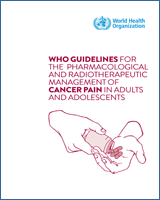In general, despite decades of research into cancer pain management, the evidence was scant or lacking for several critical clinical questions, limiting development of recommendations in these areas.
Differences in trial protocols, differences in the measurement of pain outcomes, and significant heterogeneity among trial participants limited opportunities for pooling results using meta-analysis. It would be helpful for the continuous building of evidence if assessment and measurement of pain are standardized in future cancer pain management trials to allow for statistical data synthesis. For example, a validated scale may be endorsed by country associations and recommended for use in clinical practice and research.
The risk of bias was noted to be high across many trials. Future trials should conform to standard RCT methods and investigators should ensure that methodological quality is not compromised during the conduct of the trial. The CONSORT statement provides a useful template for reporting clinical trials (197).
Clinical trial evidence was absent or very limited for the use of several adjuvant therapies, including choice of corticosteroid, and for anticonvulsants and antidepressants, despite these being part of established practice for cancer pain management. Trial research is urgently needed to address the clinical uncertainty apparent in this area. Trial data may provide supportive data to recommend the practice or, importantly, indicate if there is no benefit, or indeed harm, thus allowing for amendment of current clinical protocols to reduce unnecessary cost and avoid potential harms. Outcomes should include efficacy, safety and pharmaco-economic outcomes. Comparisons should not only be against placebo but also against analgesics and other medicines.
As in many fields, most trials were conducted in high-income settings. Research on cancer pain management should be prioritized in low- and middle-income countries where cancer is increasing significantly. As outlined in the Lancet Commission Report on Palliative Care and Pain Relief, trial investigators may wish to measure serious health-related suffering as an outcome and evaluate an essential, affordable package of palliative care and pain relief interventions (5). The latter may be best assessed by using an implementation science approach and a pragmatic trial study design. Studies are also required on the optimal route of administration for opioids and on the cost-effectiveness thereof.
Research on opioids should take account of the ongoing opioid crisis in North America and evaluate the risk for substance misuse in all trials of opioid use across different settings. Evidence-based protocols for opioid cessation should be evaluated in patients with cancer pain who no longer require pain management in order to better guide cancer pain clinicians in this area.
A global landscape analysis of the effects of restrictive legislation and regulations (including the negative effects of barriers to adequate access to opioids) will be helpful. Such an analysis may include an evaluation of the reasons why, in some countries (e.g. in Europe), opioids are available but have not resulted in an opioid crisis of the scale observed in North America.
The use of cannabinoids was not included as a PICO question in this guidelines process but is currently being widely investigated for both chronic non-cancer and cancer-related pain; trials and syntheses of current data on cannabinoids for cancer pain are warranted.
Interests Declared by Persons Involved in Guideline Development
For full details of these declared interests and GDG and ERG member characteristics, see Annex 4: Background to the development of the guidelines and details of personnel. Of the invited experts who became GDG members, none declared potential conflicts of interest that were deemed to require specific management in GDG meetings or during the guideline development process.
Funding Sources
To comply with WHO policy, no commercial entity funding has been used to produce these guidelines. Only WHO core funds have been used in the production of these guidelines.

